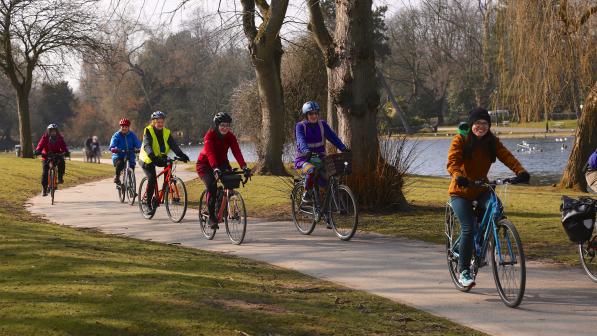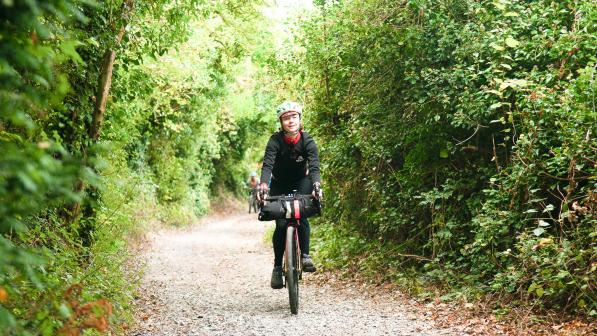‘Be kind to cyclists’: Cycling UK and British Cycling call for end to hostility

Cycling UK and British Cycling have come together by publishing an open letter in today's Times newspaper calling on the public to show tolerance towards cyclists during the coronavirus lockdown, following a worrying spate of hostile incidents.
In recent weeks, cyclists have been targeted with aggressive behaviour from motorists, signs telling them to go home, and even drawing pins placed in roads – actions often driven by a misplaced fear that cyclists present a danger of spreading the virus.
There is no trusted evidence to suggest that cyclists are any more likely to spread the disease than runners and walkers
Open letter from Cycling UK and British Cycling
In an open letter, Julie Harrington, chief executive of British Cycling, and Pete Fitzboydon, interim chief executive of Cycling UK, asked the public to “show tolerance, warmth and care” towards the overwhelming majority of cyclists who ride responsibly. They wrote:
“The Government’s guidance since the beginning of the lockdown has continued to encourage cycling for daily exercise, in recognition of the substantial physical and mental health benefits it provides to the many millions of people taking part. There is no trusted evidence to suggest that cyclists are any more likely to spread the disease than runners and walkers, if they follow the social distancing requirements.
“Far from being the villains in this story, we have been inundated with examples of clubs and groups who have gone above and beyond to support their communities during the crisis – whether that’s delivering prescriptions in Banbury, raising money for hospices in Crawley or helping to feed families in Inverness. It is deeply upsetting that these same cyclists are being met with such hostility in the process.”
In recent weeks, cyclists in Somerset have reported that drawing pins have been purposely been placed on roads, while signs urging cyclists to ‘stay away’ have been seen in Cambridgeshire, Cheshire and Powys.
Medical experts, however, say there is no reason to single out cyclists as a threat to public health. Jonathan Ball, Professor of Molecular Virology at the University of Nottingham, said:
“Cycling is an excellent form of exercise and there is no compelling scientific evidence that cycling poses any more risk for transmission of the virus provided social distancing measures are sensibly applied.”
Tragically, some people seem to have become obsessed with others’ exercise habits, including how long they’re cycling for and where
Duncan Dollimore, Cycling UK head of campaigns
Duncan Dollimore, head of campaigns at Cycling UK, put some of the blame for incidents of hostility on inconsistent and careless communication by officials.
“Throughout the Covid-19 crisis, Government and public health advice throughout the UK has made it clear that, notwithstanding limitations imposed on movement, people need to get outside for physical activity,” he said. “That’s why exercise outdoors was excluded from the restrictions, with cycling specifically recommended.
"Tragically, some people seem to have become obsessed with others’ exercise habits, including how long they’re cycling for and where. That’s led to careless language, including by some who are now concerned about threats of vigilante action against cyclists.
"Last month, Julia Mulligan, the Police and Crime Commissioner for North Yorkshire and chair of the National Rural Crime Network, told the BBC that cyclists were “a real worry”, saying that local communities were getting anxious about people riding through their villages – even though they had not done anything wrong.
"Having effectively legitimised those irrational concerns, she than had to warn vigilantes this week not to take the law into their own hands, without any appreciation that her previous comments had labelled cyclists as a problem.
"One way to help reduce the risk of threats against cyclists would be for people and the media to stop framing conversations about cyclists being a problem, and consider instead the benefits of riding a bike.”
Both British Cycling and Cycling UK are emphasising the need for cyclists to ride responsibly at this time, stressing in particular that people should only ride alone or with those they live with, and never in groups.
Last week, Cycling UK wrote to council leaders in England, Scotland and Wales urging them to adopt temporary measures to allow more space for cyclists on our roads. You can lend your voice in support of this campaign by using the simple online tool Cycling UK has created to help you create an email to send to your local councillor explaining how setting up additional space for cyclists on our roads can be achieved quickly and at low cost.

